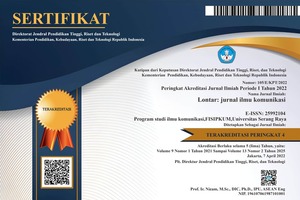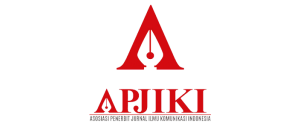TELEVISI PUBLIK LOKAL SEBAGAI RUANG PUBLIK DAN MEDIA PEMBANGUNAN PARTISIPATIF
DOI:
https://doi.org/10.30656/lontar.v5i2.487Abstract
Regional public television is a certainty, as the public sphere which disseminates the regional potency, local wisdom, motivation and awareness raising community to enhance competitiveness, independent and participate in regional development. Inside the broadcasting regulation of Indonesia, regional public television is called Lembaga Penyiaran Publik Lokal Televisi. The opportunities for the formation of regional public television in Banten province is very potential, because in the province of Banten has not yet own station TVRI itselfs, but that is still manage with TVRI Station Special Capital City of Jakarta. Diversity of Banten's culture and local language are a great potential for regional public television to make broadcasts program on several sub-languages in Banten province. However, the main issue in revision broadcasting regulation of Indonesia is no longer focused on the diversity of content and diversity of ownership. The substance of the regulations on the establishment of regional public television is no longer contained in the draft revision of the broadcasting law of Indonesia. In other side, regional peoples has a right to get localy information, not only followed hegemony’s preference and standard of Jakarta’s value. Indonesia is not only Jakarta. Regional peoples needs more quality broadcasting content as a form of representation of cultural identity; broadcasting program that contain a variety of content that can raise public awareness collectively to preserve culture values and perform positive social actions through regional public television.
References
Dahlgren, Peter, The Public Sphere as Historical Narrative, dalam Denis McQuail (ed), Reader in Mass Communication Theory, Thousand Oakes: Sage, 2002
Habermas, Jürgen (1962) English Translation 1997). “The Structural Transformation of the Public Sphere: An Inquiry into a Category of Bourgeois Societyâ€. Cambridge Massachusetts: The MIT Press.
Hardiman, Fransisco Budi, Menuju Masyarakat Komunikatif, Yogyakarta: Kanisius, 1993
Mulyana, Deddy. 2008. “Komunikasi Massa: Kontroversi, Teori dan Aplikasi†Bandung: Widya Padjadjaran.
Sudibyo, Agus. dkk. 2004. “Ekonomi Politik Media Penyiaran†Yogyakarta: LkiS
Suharto, Edi. 2010. “Membangun Masyarakat Memberdayakan Masyarakat: Kajian Strategis Pembangunan Kesejahteraan Sosial & Pekerjaan Sosial†Bandung: PT. Refika Aditama
Yin. Robert K. Studi Kasus Desain dan Metode. Jakarta, PT. RajaGrafindo Persada, 2006.
Peraturan Perundang-undangan
Rancangan Undang-undang tentang Perubahan atas Undang-Undang Nomor 32 tahun 2002 tentang Penyiaran, Koalisi Nasional Reformasi Penyiaran, 2017.
Undang-undang Nomor 23 Tahun 2000 tentang Pembentukan Provinsi Banten (Lembaran Negara Republik Indonesia Tahun 2000 Nomor 182);
Undang-undang Nomor 32 Tahun 2002 tentang Penyiaran (Lembaran Negara Republik Indonesia Tahun 2002 Nomor 139);
Undang-Undang Nomor 1 Tahun 2004 tentang Perbendaharaan Negara (Lembaran Negara Republik Indonesia Tahun 2004 Nomor 5)
Peraturan Pemerintah Nomor 11 Tahun 2005 tentang Penyelenggaraan Penyiaran Lembaga Penyiaran Publik (Lembaran Negara Republik Indonesia Tahun 2005 Nomor 28);
Peraturan Menteri Komunikasi dan Informatika Nomor 28/P/M.KOMINFO/9/2008 tentang Tata Cara dan Persyaratan Perizinan Penyelenggaraan Penyiaran;
Peraturan Komisi Penyiaran Indonesia Nomor 3/P/KPI/08/2006 tentang Izin Penyelenggaraan Penyiaran;
Peraturan Menteri Dalam Negeri tentang Pengelolaan Keuangan Daerah
Peraturan Menteri Dalam Negeri Nomor 13 Tahun 2006 tentang Pedoman Pengelolaan Keuangan Daerah, sebagaimana telah diubah beberapa kali terakhir dengan Peraturan Menteri Dalam Negeri Nomor 21 Tahun 2011 tentang Perubahan Kedua atas Peraturan Menteri Dalam Negeri Nomor 13 Tahun 2006 tentang Pedoman Pengelolaan Keuangan Daerah ;
Peraturan Menteri Dalam Negeri Nomor 17 Tahun 2007 tentang Pengelolaan Barang Milik Daerah;
Peraturan Menteri Dalam Negeri Nomor 13 Tahun 2011 tentang Pedoman Pelaksanaan Tugas Kehumasan di Lingkungan Kementerian Dalam Negeri dan Pemerintah Daerah;
Peraturan Menteri Komunikasi dan Informatika Nomor 17/PER/M.KOMINFO/03/2009 tentang Diseminasi Informasi Nasional oleh Pemerintah, Pemerintah Daerah Provinsi dan Pemerintah Daerah Kabupaten/Kota;
Peraturan Menteri Komunikasi dan Informatika Nomor 08/PER/M.KOMINFO/6/2010 tentang Pedoman Pengembangan dan Pemberdayaan Lembaga Komunikasi Sosial;
Peraturan Daerah Kabupaten Hulu Sungai Selatan Nomor 7 Tahun 2012 Pembentukan Lembaga Penyiaran Publik Lokal Murakata Televisi (Lembaran Daerah Kabupaten Hulu Sungai Selatan Tahun 2012 Nomor 7);
Peraturan Daerah Kota Tarakan Nomor 3 Tahun 2009 tentang Pendirian Lembaga Penyiaran Publik Lokal Tarakan Televisi Media Mandiri (Lembaran Daerah Kota Tarakan Tahun 2009 Nomor 3);
Peraturan Daerah Kabupaten Tapin Nomor 20 Tahun 2009 tentang Lembaga Penyiaran Publik Lokal Tapin TV (Lembaran Daerah Kabupaten Tapin Tahun 2009 Nomor 20);
Downloads
Published
Issue
Section
License
By submitting an article to the journal, the author(s) agree to transfer the published article's copyright to the journal, which will act as the publisher. This means the journal will have the right to publish the article in various forms, including reprints. The journal will maintain the publishing rights to the published articles.
In line with the license, authors and third parties (readers, researchers, and others) are allowed to share and adapt the material. In addition, the material must be given appropriate credit, provided with a link to the license, and indicated if changes were made. If authors remix, transform, or build upon the material, authors must distribute their contributions under the same license as the original.






